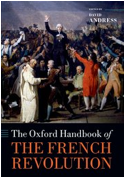French Revolution Essay Competition
To celebrate the recent publication of the Oxford Handbook of the French Revolution, the Society for the Study of French History is offering four copies of this landmark text as prizes in a student essay competition.
Prizes will be offered for essays on any aspect of the history of the French Revolution. Essays may have a single focus on France, or be comparative between French and other events, and may cover any aspects of a chronology of c. 1760-1830, as long as some focus is placed on the events and consequences of the period 1787-1799. The competition is open to students in post-16 education in any part of the UK & Ireland.
Prizes will be awarded in four categories:
- Students studying AS or A Level (or equivalent) in 2015/16 – essays with a minimum length of 1000 words; to be nominated for submission by a History teacher/lecturer;
- Undergraduate students, studying in 2015/16 at any level of a bachelor’s degree – essays of between 2000 and 3000 words; entrants may self-nominate or be nominated by a lecturer.
- Masters students, studying in 2015/16 – essays of between 3000 and 5000 words; entrants may self-nominate or be nominated by a lecturer.
- Doctoral students (including those enrolled provisionally as MPhil) at any stage of their degree in 2015/16 – essays of between 4000 and 6000 words; entrants may self-nominate or be nominated by a supervisor.
The normal expectation will be that essays will have been produced and submitted for assessment, or as practice assessments at AS/A-level, although this is not a condition of submission. Doctoral students in particular may submit pieces which summarise ongoing research, but these must be clearly written as self-contained pieces, not excerpts of a thesis.
Essays will be judged within each category on their academic merits by a panel of historians nominated by SSFH. The best essay in each category will be awarded a copy of the Oxford Handbook, which may be claimed personally by the writer, or donated to their institution. Prize-winners will have the opportunity to have their essay published online by SSFH.
Essays must be submitted electronically as PDF files, the filename itself including the author’s name, via email to andrew.wm.smith@ucl.ac.uk with a covering note indicating which category the piece is submitted under, and confirming contact-details for subsequent correspondence.
The closing-date for the competition is 12 noon on Thursday 14 July 2016. Prize-winners will be notified, and prizes despatched, in September 2016.
Further information:
The Oxford Handbook of the French Revolution contains over 650 pages of cutting-edge scholarship from 37 contributors. It brings together a sweeping range of expert and innovative contributions to offer engaging and thought-provoking insights into the history and historiography of this epochal event. Each chapter presents the foremost summations of academic thinking on key topics, along with stimulating and provocative interpretations and suggestions for future research directions.
Placing core dimensions of the history of the French Revolution in their transnational and global contexts, the contributors demonstrate that revolutionary times demand close analysis of sometimes tiny groups of key political actors – whether the king and his ministers or the besieged leaders of the Jacobin republic – and attention to the deeply local politics of both rural and urban populations. Identities of class, gender and ethnicity are interrogated, but so too are conceptions and practices linked to citizenship, community, order, security, and freedom: each in their way just as central to revolutionary experiences, and equally amenable to critical analysis and reflection.
This volume covers the structural and political contexts that build up to give new views on the classic question of the ‘origins of revolution’; the different dimensions of personal and social experience that illuminate the political moment of 1789 itself; the goals and dilemmas of the period of constitutional monarchy; the processes of destabilisation and ongoing conflict that ended that experiment; the key issues surrounding the emergence and experience of ‘terror’; and the short- and long-term legacies, for both good and ill, of the revolutionary trauma – for France, and for global politics.
General Enquiries Should be addressed to the Secretary of the Society:
Dr. Andrew W M Smith
Department of History
University College London
Gower St, London
WC1E 6BT
Tel: 0203 108 1144
Email: Andrew.WM.Smith@ucl.ac.uk
Download the flyer for the competition here

Reviews of The Oxford Handbook of the French Revolution:
“This handbook is a gem … a superb reference work that doubles as a good read for anyone interested in this massive and complex subject … Essential.”
– G. P. Cox, Choice
“The great success of this Handbook is to present a picture of the Revolution, and its historiography, as the hectic criss-crossing of many individual paths: this bustling, confusing, noisy, and fearful time of upheaval is well conveyed in these pages…. The Handbook offers a convenient and scholarly starting-point or refresher on many different aspects of that turbulent epoch and on its repercussions, one which will be valuable in teaching and research. The editor and his collaborators are to be congratulated.”
– Anne Byrne, Reviews in History (see full review here)
French Revolution Podcast
Professor David Andress’s online resource for students taking the French Revolution and Terror at A-level is also available from our website.

